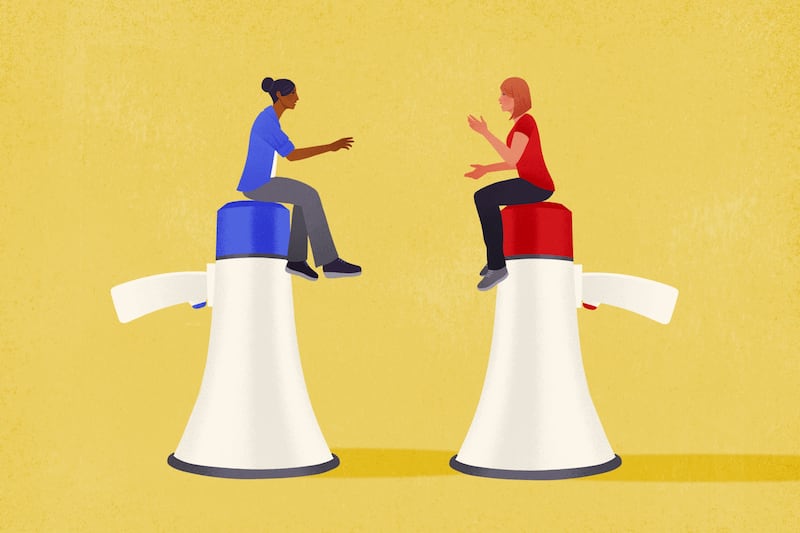Free speech is a cause promoted and defended by many groups and from many perspectives. But there is one threat to free speech that is getting overlooked in our angry society — the contempt that surrounds us so much we can hardly see it anymore.
Contempt suppresses speech, and the effects ripple in all directions. When we face contempt for expressing our views, we’re less likely to say what we think. When we can’t say what we think, we can’t talk to each other. When we can’t talk to each other, we can’t solve our problems together. And the frustration of living with problems we can’t solve ends up pushing us into chaos.
These are the costs of inhibiting free speech, and many of us have some responsibility for them — because so many of us fall into contempt at times. We want the people who oppose our views and values to just stop talking. And we resort to contempt to keep them quiet, or at least keep them from being heard.
But that makes our conversations fade and our problems fester.
In 2022, we introduced the Dignity Index, an eight-point scale that measures how we treat each other when we disagree. When we used the Index to score political speech in Utah’s 2022 midterm elections, we saw that much of the campaigning was an exchange of attacks instead of real conversation.
If we want a real conversation, we should consider a more effective way. When we treat others with dignity, we explain our values, state our goals, and make proposals. We speak respectfully, listen carefully and ask for more information. And we debate the specifics: what was done or not done? Did it work or not work? Did people benefit or did people suffer?
When candidates took this approach and treated each other with dignity, we saw political debates turn into problem-solving sessions — and that inspired all of us.
In the years since, the Dignity Index has been taken up by corporations, universities, government officials, town councils and other groups who find that treating others with dignity improves performance.
At the same time, in a country that is founded on freedom of speech, there is natural skepticism about any effort that might inhibit speech.
And I get it. As someone who’s made my living as a writer, I have an inner voice that growls: “Don’t you dare tell me what to say!”
But when I or others decide to use more dignity and less contempt, it’s not because anyone is telling us what to say. We are telling ourselves what to say — because we want to be heard, and we want to hear others as well.
Of course, we’re all free to use contempt. But when we see its effects, we’re far less likely to want to, especially when we see that treating others with dignity can heal divides in our marriages, our families, our communities and our country.
Still, some insist that any appeal for dignity is just another form of “language policing” that will keep people from speaking their minds.
In our experience, the opposite is true: When we discourage contempt, we encourage speech. When we treat others with dignity, we say what we think … but in a way that encourages others to say what they think.
This is the core of free speech — making everyone feel they are free to speak. It’s how we create conversations.
Free speech has nation-building powers not because of our individual statements, but because of the conversations that flow from those statements. It’s in our conversations that we raise issues, offer solutions, solve problems and make plans. It’s in our conversations that we come to understand each other.
When we speak with contempt, by contrast, we inhibit any response, and so we kill the conversation. When we insult the other side in the name of free speech, we’re actually inhibiting speech. We’re saying, in effect, “free speech for me … but not for you.” And that ends any useful conversation.
In the end, appealing for more dignity in our public debate highlights the need to cultivate and elevate this skill: to make the case for our most passionate views to someone who has the opposite views — and to do so without attacking the other side, without walking away, and without going silent.
Instead, we listen, explain, ask for more information and stay in the conversation.
If there is good news beneath the rising wave of bad news, it’s that our divisions, our hostile debate and our rising violence are not caused by global forces we can’t control. They’re caused by how we treat each other.
And the simple decision to treat others with dignity, even when we disagree, can start to turn things around.
In the end, our future doesn’t depend on whether liberals or conservatives prevail; it depends on whether dignity or contempt prevails.


